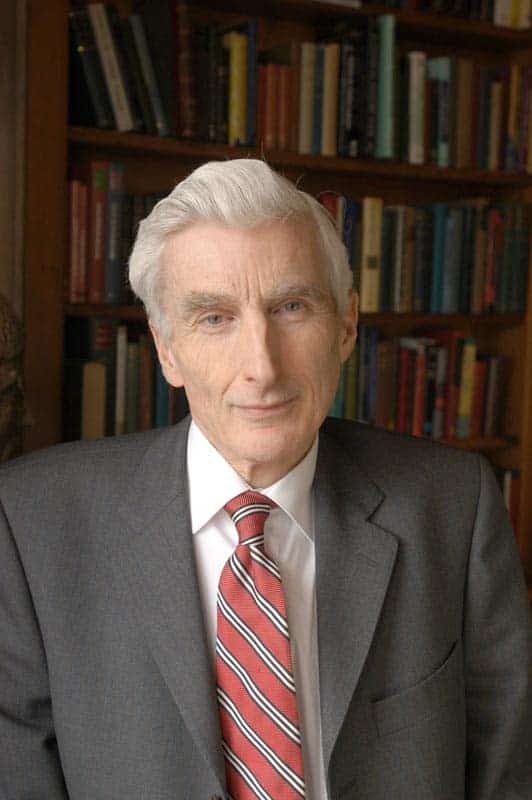
The cosmologist Martin Rees, former president of the Royal Society, has won this year’s £1m Templeton Prize – the world’s largest annual award given to an individual. He was awarded the prize for his “profound insights” into the nature of the cosmos that have “provoked vital questions that address mankind’s deepest hopes and fears”. The 68-year-old will be presented the award by the Duke of Edinburgh at a ceremony at Buckingham Palace on 1 June.
As the author of more than 500 research papers, Rees has spent decades investigating the implications of the Big Bang, and the nature of black holes. He has also made important contributions to the origin of cosmic microwave background radiation, as well as to galaxy formation and the concept of “multiverses”. The Templeton Foundation has given Rees this year’s prize for raising such “big questions”, that “strike at the core of life, fostering spiritual progress that the Templeton Prize seeks to recognize”.
“The questions Lord Rees raises have an impact far beyond the simple assertion of facts, opening wider vistas than any telescope ever could,” says John Templeton Jr, president and chairman of the Templeton Foundation, in a statement. “By peering into the farthest reaches of the galaxies, Martin Rees has opened a window on our very humanity, inviting everyone to wrestle with the most fundamental questions of our nature and existence.”
Rees, an atheist, told physicsworld.com he was “surprised” by the award and that his views on science and religion are “rather boring” and that he tries to avoid discussing it. “I suppose I was awarded the prize because I have encouraged big questions to be asked such as is there life out there?” Rees says. He adds he had no qualms about accepting the award and that has not yet decided how he will spend the £1m prize money.
The questions Lord Rees raises have an impact far beyond the simple assertion of facts, opening wider vistas than any telescope ever could John Templeton Jr, president and chairman of the Templeton Foundation
Robert Williams, president of the IAS, who recommended Rees for the prize, told physicsworld.com that, although Rees does not explicitly write about religion, he does touch on the same important themes of origins and development of the universe through natural processes, which are at the core of the foundation of many religions.
“I consider it very forward thinking of the Templeton Foundation to acknowledge, through this award to Martin, the importance of carrying on these discussions in less directly religious language and context, as opposed to the more traditional manner of addressing these fundamental questions of ‘How did we get here?’ as a by-product of divine intervention,” he says.
Another scientist to nominate Rees was Virginia Trimble from the University of California at Irvine. She told physicsworld.com that her nomination “focused strongly on Martin’s enormous scientific contributions over a wide range of questions and answers, many of which bear on traditional human questions such as what is the world made of; how did it get to be that way; what will happen in the distant future.”
Our final century
Martin Rees was born in 1942 in York and grew up in Shropshire. In 1960 he went to Cambridge University to study mathematics and was awarded a bachelor’s degree in 1963. In 1967 he was awarded a PhD in theoretical astronomy and, after a spell in the US at the Institute for Advanced Study in Princeton and Harvard University, Rees returned to Cambridge in 1973. In 1992 he was knighted and three years later became Astronomer Royal. In 2005 he was appointed president of the Royal Society, a post he held until 2010. In the same year he was also made a life peer.
Rees is the author of several books, writing mostly about humanity’s future on Earth. In his latest book – Our Final Century: Will the Human Race Survive the Twenty-first Century? – which was published in 2003, he controversially estimated that the probability of extinction before 2100 was around 50% due to the possibility of accidental release of destructive technology. He is planning on publishing his next book soon, entitled What We Still Don’t Know. Rees, however, says he will not start writing about science and religion now that he has won the prize.
The Templeton Prize was established in 1972 by the late philanthropist Sir John Templeton. According to the Templeton Foundation, it is awarded for “progress toward research or discoveries about spiritual realities”. It is awarded by a nine-member committee currently chaired by psychologist Durre Sameen Ahmed from the National College of Arts in Pakistan. Physicists have been particularly successful in recent years: former laureates include Bernard d’Espagnat (2009), Michael Heller (2008), John Barrow (2006), Charles Townes (2005), George Ellis (2004), John Polkinghorne (2002), Freeman Dyson (2000) and Paul Davies (1995).



